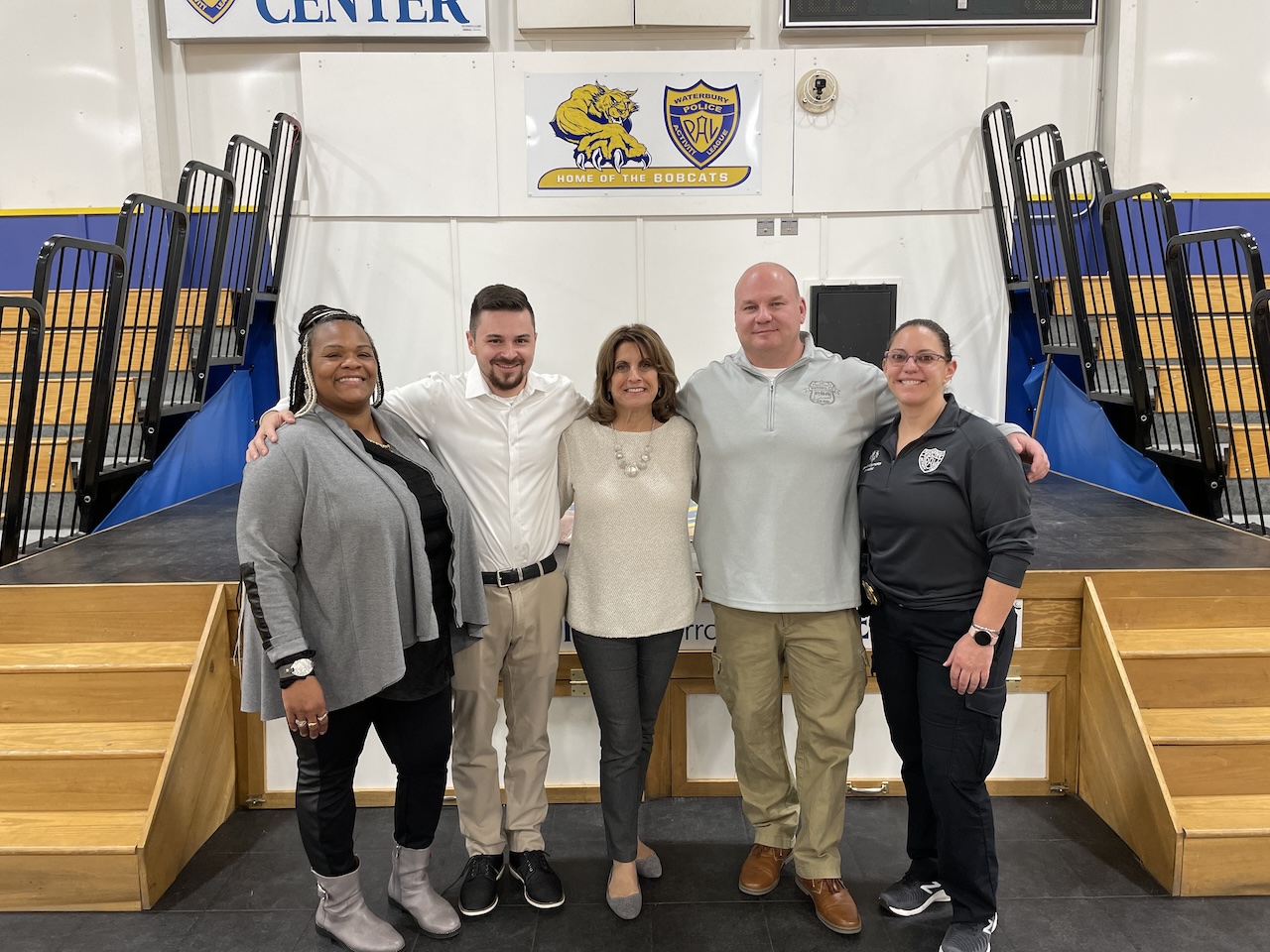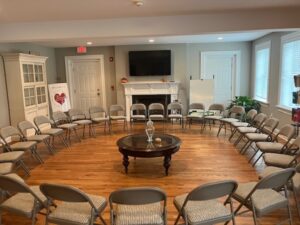Main Street News

CT Parent Connection Seeks to Educate Parents About Youth Addiction
When Dorrie Carolan realized that her son was suffering from addiction in 1993, she knew she had to do whatever she could to help him.
“Around the same time that my son was in the beginning of his addiction, I had a lot of people who were talking about their kids experimenting with drugs, so I worked on getting some space where we could have a meeting once a month and discuss how we were going to deal with this and keep our kids safe as parents,” Dorrie said.

She held town-wide meetings for the community that later led to policy changes at the local schools, including the addition of a security guard at the high school in Newtown.
Through this struggle, Dorrie realized that this was an issue affecting many others in the community, and that there were limited resources for struggling families. From there, she made it her mission to provide educational resources and support for community members and families affected by the “insidious disease of addiction.”
Her son, Brian, lost his battle with addiction in May of 1999. In 2003, after 13 other substance abuse-related deaths in the Newtown area, Dorrie officially formed Newtown Parent Connection, a 501(c)3 nonprofit substance abuse organization that would later become known as CT Parent Connection.
Services offered
The CT Parent Connection aims to work with town agencies, police departments, schools, and religious communities to prevent drug and alcohol use and abuse among the younger populations.
They currently have three ‘Hope & Support’ groups that meet weekly. The first meets at St. Peter’s Episcopal Church in Milford on Mondays; the second meets at St. John’s of the Cross in Middlebury on Tuesdays; and the third meets at the Parent Connection offices in Newtown on Thursdays. The groups are a gathering for parents and families affected by a loved one’s substance abuse.
According to their website, the groups are “facilitated by a licensed therapist and provide a confidential venue to receive information and support concerning how to handle their child’s or loved one’s suspected or confirmed use of substances.”
They also host a monthly bereavement group in Newtown that provides support for those who have lost a child or loved one to substance abuse.
For Dorrie, the importance of hosting support groups weekly is to not only help those throughout the state of Connecticut, but also to reach out to surrounding states to offer support for struggling parents and families located there too.
“It’s a difficult situation, and a lot of local people might be afraid or too shy to go to their own town group. We want the surrounding areas to know that we’re here to offer support if they need it.”
 In addition to this, they also work closely with many other local organizations, including Al-Anon Family Groups, which is a mutual support program for those whose lives have been affected by someone else’s drinking; Alcoholics Anonymous Answering Service, which is a worldwide organization of people who help each other stay sober; the Substance Abuse & Mental Health Services Administration, which is the agency within the U.S. Department of Health and Human Services that leads public health efforts; The Connecticut Department of Mental Health and Addiction Services, which is a health care agency whose mission to promote overall behavioral health through comprehensive and efficient services; and 211 of Connecticut, which is a free, confidential information and referral service that connects people to health and human services 24/7 online and over the phone.
In addition to this, they also work closely with many other local organizations, including Al-Anon Family Groups, which is a mutual support program for those whose lives have been affected by someone else’s drinking; Alcoholics Anonymous Answering Service, which is a worldwide organization of people who help each other stay sober; the Substance Abuse & Mental Health Services Administration, which is the agency within the U.S. Department of Health and Human Services that leads public health efforts; The Connecticut Department of Mental Health and Addiction Services, which is a health care agency whose mission to promote overall behavioral health through comprehensive and efficient services; and 211 of Connecticut, which is a free, confidential information and referral service that connects people to health and human services 24/7 online and over the phone.
Biggest challenges
One of the most challenging aspects of Dorrie’s job is placing people in detox, residential treatment, and sober living homes.
“Placements are very, very difficult, especially for those on state aid. There are many times when there are no beds available, with a wait of one week or more! Unfortunately, we need to move quickly with the substance user, because there’s a small window of their readiness to get help. More than that, with fentanyl being laced in many drugs, it becomes a very dangerous situation. Most of the overdoses we’re seeing right now are fentanyl-related,” she said.
She explained a particular story where a young woman violated her probation and was mandated to go to treatment within 48 hours or she would go back to jail. “How can you mandate someone into treatment or back to jail when they can’t get a bed in any rehab center? Mandating her back to jail doesn’t do anything for her. If you’re going to put her in jail, do it after she goes through rehab.”
 Dorrie said that over the years, she has made important connections with treatment centers, sober living homes, and outpatient care that has enabled her to be able to call in a favor when she has to.
Dorrie said that over the years, she has made important connections with treatment centers, sober living homes, and outpatient care that has enabled her to be able to call in a favor when she has to.
According to Dorrie, adults who come home after 28 days are more likely to relapse than those who complete continuing care for six months to a year. “It takes at least 90 days before you’re sleeping and feeling better. Most people that go into treatment succeed as long as they don’t leave the program. When they go outside of that structured program, that’s when they’re more likely to relapse.”
Dorrie also shared that she’s found it to be much easier to get young adults into detox programs than into treatment centers. “My hope is that they’ll open more sobering centers and intensive outpatient programs.”
Currently working on
One of the things that CT Parent Connection is currently focusing on is combating the widespread vaping that is so popular among teenagers and young adults. “Vaping is huge, and it’s in middle school and high schools around the country. We’re talking kids that are in their teens and are doing irreparable damage to their bodies,” Dorrie said.
She also claimed that many vaping stores are selling products with a higher level of THC than what is approved, which is contributing to addiction amongst teens and young adults.
She also noted that the legalization of marijuana has been conflicting for teens and young adults. “I’ve had parents come to me just before marijuana was legalized and tell me that they don’t want their children purchasing it off of the street, so they went to get their children medical cards to obtain marijuana that way, so they didn’t have to worry about it being laced with anything. I understand that parents are scared about what their children are buying on the streets, but when you’re providing it for them, you’re condoning it.”
This is why she emphasizes that addiction education is so important now. “Kids never think that something detrimental is going to happen to them because of their drug use, that’s why we need to get to them now to prevent it.”
CT Parent Connection recently just hosted a panel about change. “We know that change has to come from the community, so we invited a local police officer, a young man who successfully completed treatment, and a psychiatrist to speak about the impact that drugs and alcohol have on the brain.”
They have also previously hosted vaping education workshops and presentations and plan to conduct more in the coming months. Their next forum titled “Seeing Through the Vapor,” will take place at Newtown Middle School on Monday, November 13th at 6 p.m and is free to all to attend.
If you’re interested in attending any upcoming events hosted by CT Parent Connection, visit their event page here.
CT Parent Connection
2 Washington Square, Newtown, CT 06470
(203) 270-1600
https://www.ctparentconnection.org/


